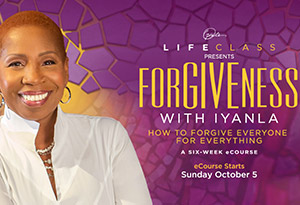Iyanla Vanzant: The One Person (You'd Never Expect) Who's Causing Your Pain
So many of us don't ask for what we want. To go back to the example of a friend who doesn't help, maybe you never asked for favors but only hoped she'd offer to do what you clearly needed (as you've done for her). Most of us put up with or ignore or excuse whatever it is that shows up.
I experienced this in my own marriage. It was a 40-year-long relationship, and I didn't ask for what I wanted. I accepted what I thought my husband was capable of giving me. I avoided what I thought would upset him. I allowed myself to believe that his needs were more important than mine. That doesn't make him a bad person, and it doesn't make me an idiot. It just means that I needed to learn how to ask.
But to do that, you've got to be willing to hear "no." Just because you ask for what you want doesn't mean that you're going to get it. Take money. Sometimes people will ask for it, and then, when they don't get it, they add on another level of pain because the no feels like rejection to them. They may even wonder if they're not smart or good or cared for enough to deserve the money. They're not ready for the possibility of a negative response, so they stop, paralyzed. But if you are prepared for it, you'll know what your next steps are going to be, and you'll get busy taking those steps instead of getting hurt.
4. Learn the Uncle Boo-Boo Lesson
The way you ask for what you want or need is also crucial. Say you have an uncle, and whenever the family gets together, he gives you a long, unsolicited and unnecessary critique about how you look and what you do. You don't go up to him and say, "Uncle Boo-Boo, I wish you wouldn't make fun of my hair and job at the dinner table."
No! Wishes may or not be granted. First you ask for what you want, and then you inform Uncle Boo-Boo of a specific, clear consequence. You say to him: "I'm no longer giving you permission to speak to me in that manner. And if it continues to happen, I will no longer be a part of these gatherings, and I'm going to let everyone else in the family know why."
People often engage in behavior that causes pain because there's no consequence. You have to create that consequence; otherwise, the asking is just wind in the air. But I want you to remember: You're creating a boundary—not a wall that isolates you, just a boundary, one that can be communicated with compassion. So when I get ready to speak to Uncle Boo-Boo, I'm not going to yell at him in front of the whole table. I'm going to say, "Uncle Boo-Boo, can I speak to you for a moment?" Then I'm going to take him on the porch, in the hall or in the living room where there's no one else and discuss my need, because this is between him and me. If I am feeling pain, I'm no longer going to permit, facilitate or deny it. I'm going to own it and deal with it, and then, no matter what he says in response, I can begin to heal. This is a natural process. Over time, you'll have more awareness. You learn to accept more of who people are, and, most importantly, you learn to accept more of who you are.
Iyanla Vanzant's most recent book is Peace from Broken Pieces: How to Get Through What You're Going Through (SmileyBooks).

Learn how to forgive everyone for everything—sign up for Iyanla’s on-demand eCourse today.
More From Iyanla Vanzant











